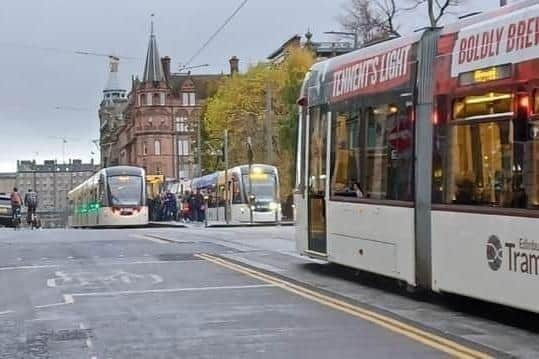Edinburgh Tram Inquiry raises an important question: what's the point in having inquiries? – Stephen Jardine
It’s dragged on so long, originally William Paxton probably hoped to pick up the contract but at long, long last the Edinburgh Tram Inquiry report has been sent to the printers. To call it long-awaited is the ultimate understatement.
Originally commissioned in June 2014, the statutory hearing has taken nine years and cost more than £13 million to date. It was ordered to work out why something had taken too long and cost too much money and yet has taken too long and cost too much money.
Advertisement
Hide AdAdvertisement
Hide AdIts original focus is almost lost in the mists of time but it remains one of the most shameful episodes in public administration. Back in 2003, the then Labour-led Scottish Executive proposed building a network of tram lines at a cost of £375 million by 2009. The project then became a political football before getting underway in 2007. By the time, it was completed the price had more than doubled, the project scope had halved and the whole thing had taken twice as long as expected.
Roll on the public inquiry you might think. Unfortunately, that has proceeded with the pace of a tram carrying a herd of elephants. To be fair, the staff have had to sift through more than six million documents and interview dozens of witnesses.
On top of that, at one point the chairman, Lord Hardie, was taken ill and a break-in took place at the inquiry team’s offices. However, with the vast majority of the bill so far taken up by lawyers’ fees, it’s perhaps no surprise this has all taken longer than the Chilcot Inquiry into the Iraq War.
Of course, we need to wait for the conclusions… or do we? Back in 2011, a review by Audit Scotland decided the tram project had been doomed to fail because of poor planning, contract disputes and a lack of clear leadership by the council. It’s hard to see what the Tram Inquiry can add to that.
Individuals without the expertise or ability to deliver such a huge public infrastructure project were railroaded into contracts that were fraught with danger and represented a very poor deal for the council and taxpayers. In short, it should never have happened the way it did.
The problem is, anyone who lived in Edinburgh during the construction process could have told you that, without recourse to a law degree or a £13 million inquiry. The incompetence and ineptitude were obvious with every twist and turn of the saga.


With actions come consequences, except in this case. The Trams Inquiry has dragged on so long, all those responsible for the mess have long since headed for the hills.
No one will lose their job, no one will be held personally accountable for any of this. It won’t even change how we do these things. Edinburgh Council opted not to wait for the outcome before pressing ahead with the next phase of the trams project, which is now completed and due to open soon.
Advertisement
Hide AdAdvertisement
Hide AdIf there is a lesson from all of this, it is that councils should concentrate on fixing potholes and leave complex infrastructure projects to others. And when things do go wrong and someone suggests a public inquiry, there is one simple question for us all to ask: what’s the point?
Comments
Want to join the conversation? Please or to comment on this article.